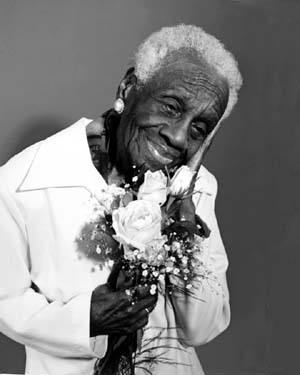National Gay History Project 2012: Ruth Ellis
Special Feature: National Gay History Month Project 2012
Ruth Ellis: Age Knew No Bounds
by Susan Horowitz
She was the matriarch of Detroit’s LGBT community. And more than a decade after her passing, her memory lives on.
Ruth Charlotte Ellis lived to be 101 and was an active and much-beloved member of the community right up until the end. She danced her way—literally—into the hearts of many who were impressed with her warmth and quiet dignity, and inspired by her drive and frequent random acts of kindness.

Ellis was born on July 23, 1899, in Springfield, Illinois. She recalled hiding in her home during the Springfield race riots of 1908. Later, she fell in love with her white gym teacher, who held her hand to complete a class circle when other students wouldn’t.
Encouraged by the promise of better wages, Ellis moved to Detroit in 1937, where she watched over a white family’s child in Highland Park for seven dollars a week. Soon, however, she put the printing-press knowledge she had picked up in Springfield to work by securing a position with Waterfield and Heath, where she worked until she opened her own press some years later.
Ellis ran her business out of the West Side home she shared with her partner, Ceciline “Babe” Franklin. The couple became known for their weekend house parties, a haven for young LGBTs who had nowhere else to go. She took several of them in, and even helped a few through college before she retired and moved to a downtown seniors complex. Franklin moved to Southfield, but the two shared keys to one another’s residences, and the relationship continued until 1975, when Franklin suffered a heart attack on her way to work.
“I don’t think it was love,” Ellis once said about her 30-year relationship with Franklin. “(But) she was good for me. She taught me how to take care of myself.”
Ellis remained active after the loss, and took up photography and bowling. She traveled often and began helping out elderly neighbors, running errands for them and picking up their groceries.
In the late 1980s, Ellis was at a self-defense class when she met Jay Spiro, whom she correctly identified as a fellow lesbian. The two had dinner and Spiro began introducing Ellis around. Soon, crowds were lining up to dance with Ellis at parties and social functions, where she developed a reputation for wearing out her dance partners on the floor.
“I love good dance music and classical music,” she told the Michigan LGBT newspaper Between the Lines in 1999. “When I am dancing, people say, ‘Miss Ruth, I have got to quit, I am too tired.’ But I’m still dancing.”
The awards and accolades began at about this time, as the public took notice of Ellis’ remarkable life, her entrepreneurial skills, and the assistance she provided to younger LGBTs for several decades. She was honored with lifetime-achievement awards, resolutions from the mayor and other officials, and even an honorary doctorate.
But the greatest recognition came as her 100th birthday drew near. Living with Pride: Ruth Ellis at 100, the documentary-style telling of her life by Yvonne Welbon, won top honors at several major film festivals. Ellis was written up in virtually every major LGBT publication across the country, and was even profiled by the mainstream African-American Essence magazine and in feminist publications like Ms.
Ellis eventually tired of the attention. Her failing health caused her to cut down her travel schedule, and she even turned down the chance to appear on The Oprah Winfrey Show.
“I’m getting to be too important,” Ellis said at the time. “I never imagined all of this. I guess no one has ever seen a lesbian this old before.”
Ellis was hospitalized in the summer of 2000—at age 101—dehydrated and exhausted. But she struggled to hold on until she made it back home, where she wanted to make her transition. She died in her sleep in the early morning hours of October 5.
Often amazed at her own celebrity, Ellis frequently asked why everyone made such a “fuss” over her. Those who had the pleasure of knowing her, however, would never ask such a question.
“Ruth positively touched lives across North America,” said Johnny Jenkins of Detroit Black Gay Pride. “Her spirit touched the essence of our humanity.”
And her spirit continues to touch us today through the work of the Ruth Ellis Center, the groundbreaking youth shelter, transitional living and outreach program founded in 1999. Ellis was on hand for the ribbon-cutting of the agency’s first drop-in center in 2000.
Ruth’s House, the center’s transitional-living quarters, opened in 2004, and the agency continues to thrive as it provides short-term and long-term residential safe space and support services for runaway, homeless, and at-risk LGBT youth in Detroit and southeastern Michigan.
Comedian and Emmy-winning actor Wanda Sykes visited the center in 2010 and again in 2012. She was so impressed by what she saw that she Tweeted to her more than 100,000 followers about the center and went on to star in a public-service announcement for the agency. She also hosted a fundraising dinner for the agency and donated $15,000.
If Ellis was surprised by how much attention she garnered in her lifetime, she would have been awestruck to know how her work has continued and her memory lives on.










